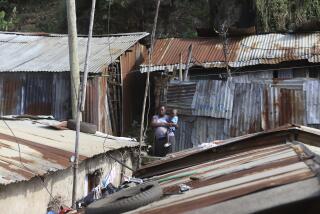Africans Find No Glitter in Golden Years
- Share via
NAIROBI, Kenya — Joseph Gitau never expected old age to be like this. He had pictured himself at home, surrounded by his three wives and nine children. But the former police officer and freedom fighter found himself on the streets of Nairobi, alone and begging for food.
Gitau, 92, is one of an estimated 800,000 elderly Kenyans--one of every five--who are living out their final years forgotten and uncared for.
The traditional ways of a rural, agricultural society that once supported Kenya’s old are falling victim to the struggle for economic development and a rapidly changing social structure.
The situation is similar for the elderly in many countries in Africa, where improved health care has resulted in longer lives, but worsening economic conditions are making those extra years precarious.
Gitau describes his life as a “curse.”
He lost his first wife in childbirth and his other two wives and children in a car crash. Then his remaining relatives, who in times past might have supported him, chased him out of the village to take control of his land--an increasingly precious commodity in Kenya.
He lived on the streets from the mid-1980s until 1992, when a church got him a place at the Cheshire Home for the Aged.
Even if Gitau’s relatives had wanted to care for him, they would have had a difficult time. Kenyans increasingly face a tough choice: Look after their elders or put food on the table.
“It’s often money, not the heart, that speaks,” said Nana Apt, president of the African Gerontological Society.
That’s the case with Joyce Wambui, who is struggling to take care of her elderly mother on her own.
Widowed, unemployed and living far from her hometown and any community support she may have had, Wambui is responsible not only for her 64-year-old diabetic mother but for her own six children.
In the past, her children would have looked after their grandmother. Today, they go to school.
“I’m the one who bathes her; there is no one else,” Wambui said.
With many children in school and mothers and fathers heading to the cities to find work, the elderly are frequently forced to follow their families. But it can be hard to adjust to an urban pace so late in life.
Sometimes they end up on the street. That is what happened with one confused woman who was found wandering in Nairobi’s Kariobangi slum.
“Patronella,” as she was named by the nuns who care for her at the Cheshire Home, says only one word over and over: “Mzuri.” It’s Swahili for good.
“We don’t know where she comes from or how old she is. We kept hoping someone would come and claim her, but no one has,” said Sister Margaret Boyle, greeting Patronella with a hearty “mzuri” and a handshake. Patronella’s face creases into a smile, and like a broken record she starts chanting “mzuri, mzuri.”
While Kenyan seniors are often adversely affected by modern life, they seldom reap its benefits, such as advancements in modern medicine.
Instead of seeking treatment for cataracts, the old view blindness as inevitable. After they lose their teeth, they face malnutrition and starvation because they don’t know to get dentures or change their diet.
AIDS also takes its toll on the elderly. With an estimated 9% of Kenya’s 28 million people infected, the elderly are relied upon to care for the sick as well as the orphans their children leave behind.
And if they show evidence of infection, doctors sometimes refuse to test them, saying they’re too old to get AIDS, said Kathleen Okatcha of HelpAge Kenya, the local branch of the global elderly aid group HelpAge International.
The old see no alternative to just carrying on.
“There is no other way. You still have to live,” said John Irungu, 73, who goes to a Nairobi church once a week to receive food.
Many elderly Kenyans and their families are turning to private organizations for help.
HelpAge Kenya, for example, assists more than 3,500 women in its “Adopt-a-Granny” program. Its Home of the Elders, like Cheshire Home, is a place where families unable to care for elderly relatives can turn for assistance.
John Kihoro, 76, moved to the home after his eldest son died and his remaining four children were unable to care for him.
He spends his days crafting wooden-cross necklaces, chatting with new friends and playing checkers and is grateful he avoided having to live on the streets.
“I am lucky,” he said.
More to Read
Sign up for Essential California
The most important California stories and recommendations in your inbox every morning.
You may occasionally receive promotional content from the Los Angeles Times.













